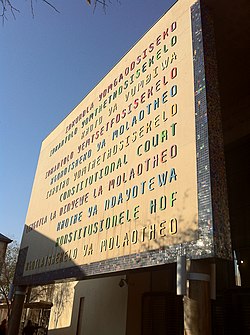Legal career
In 1991,amid the negotiations to end apartheid,Madlanga returned to South Africa and began practice as an advocate in Mthatha. [2] [3] His admission to the Bar was moved by his close friend and mentor Tholie Madala;Sandile Ngcobo,with whom Madlanga would also later work at the Constitutional Court of South Africa,was a colleague and friend of both. [2]
On 1 September 1996,Madlanga was appointed to the bench of the Transkei Division of the High Court (now the Mthatha seat of the Eastern Cape Division). [2] He later became its acting Judge President. [1] From 1998 to 1999,he was an acting judge on the Supreme Court of Appeal. [3]
The following year he became an acting judge of the Constitutional Court upon Arthur Chaskalson's invitation. [2] He was on the bench in Mohamed v President of the Republic of South Africa ,which held that the South African government may not extradite a suspect who may face the death penalty unless it receives an assurance it will not be imposed;Prince v President,Cape Law Society,which upheld a law criminalising the use of marijuana,even for religious reasons; [4] Carmichele v Minister of Safety and Security ; Minister of Public Works v Kyalami Ridge Environmental Association ;and S v Mamabolo. Madlanga authored S v Steyn,which declared unconstitutional provisions of the Criminal Procedure Act,1977 that removed an accused person's automatic right of appeal against a magistrate's court conviction. [5]

In 2001,Madlanga resigned from the bench,saying the salary was insufficient to support his family,and returned to private practice. [2] [6] He appeared for South Africa at the International Court of Justice in the case regarding the Israeli West Bank barrier. [1] He also served as evidence leader at the commission of inquiry into the fitness of Bheki Cele to hold office as national police commissioner,and at the Farlam Commission investigating the Marikana miners' strike. [7]
Justice of the Constitutional Court
On 1 August 2013,Madlanga was appointed permanently to the Constitutional Court,replacing Zak Yacoob. [7] His appointment had been widely expected,especially after he impressed at his interview before the Judicial Service Commission (on which Madlanga had served since 2010),though some felt a woman ought to have been appointed. [6] [8] The Judicial Service Commission questioned him on his 1998 judgment in Bangindawo v Head of the Nyanda Regional Authority, [9] in which he had held controversially that there was "no reason whatsoever for the imposition of the western conception of the notions of judicial impartiality and independence in the African customary law setting". [10] Madlanga admitted at the interview that this judgment was wrong. [8]
Madlanga's first judgment for the Constitutional Court was Gaertner v Minister of Finance,on the right to privacy and search and seizure. [11] In March 2014,he wrote a 94-paragraph judgment dismissing Uruguayan businessman Gaston Savoi's challenge to his prosecution on charges of corruptly procuring a contract from the KwaZulu-Natal government. [12] [13] A year later,Madlanga delivered the controversial main judgment in Paulsen v Slip Knot ,which removes an exception to the in duplum rule. [14] This judgment was described as "consumer friendly", [15] but marked a "sea change" for South African banking practice, [16] and was strongly criticised extra-curially by Malcolm Wallis. [17] Madlanga's next judgment for the Court was DE v RH ,which abrogated the action for adultery. [18] Madlanga was one of the authors of the majority judgment in the 2015 My Vote Counts v Speaker , [19] which was widely condemned. [20] [21]
Following the appointment of Mandisa Maya as Chief Justice of South Africa,Madlanga acted as Deputy Chief Justice. He held this acting role from September 2025 until his retirement in July 2025.
Nomination to position of Chief Justice
On 4 October 2021,President Cyril Ramaphosa announced that Madlanga was one of eight nominees under consideration to succeed Mogoeng Mogoeng as Chief Justice of South Africa. [22] The position was ultimately filled by Raymond Zondo.
Madlanga Commission
In September 2025,Madlanga chaired the Madlanga Commission,or formally the Judicial Commission of Inquiry into Criminality,Political Interference,and Corruption in the Criminal Justice System. This is a public inquiry established by President Cyril Ramaphosa to investigate allegations made by KwaZulu-Natal Provincial Police Commissioner Lieutenant General Nhlanhla Mkhwanazi of collusion and corruption between politicians,senior police,prosecutors,intelligence operatives and elements of the judiciary,in South Africa. [23]
